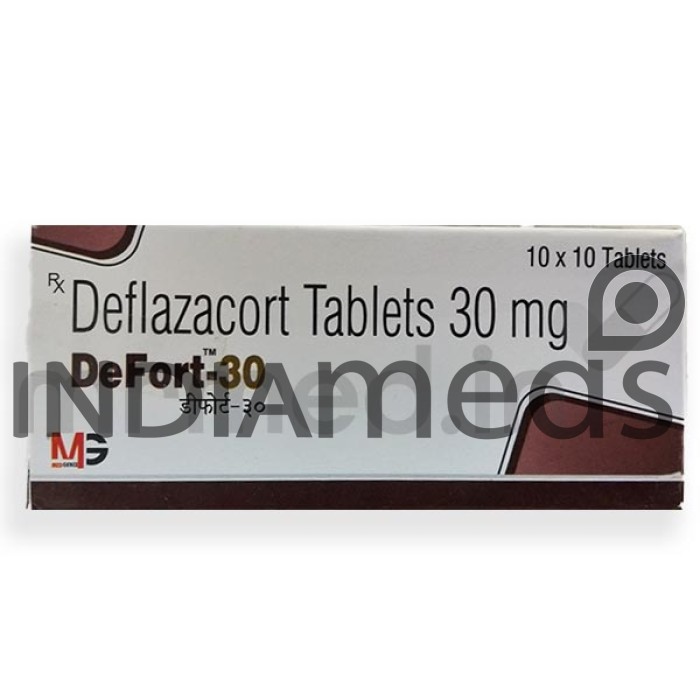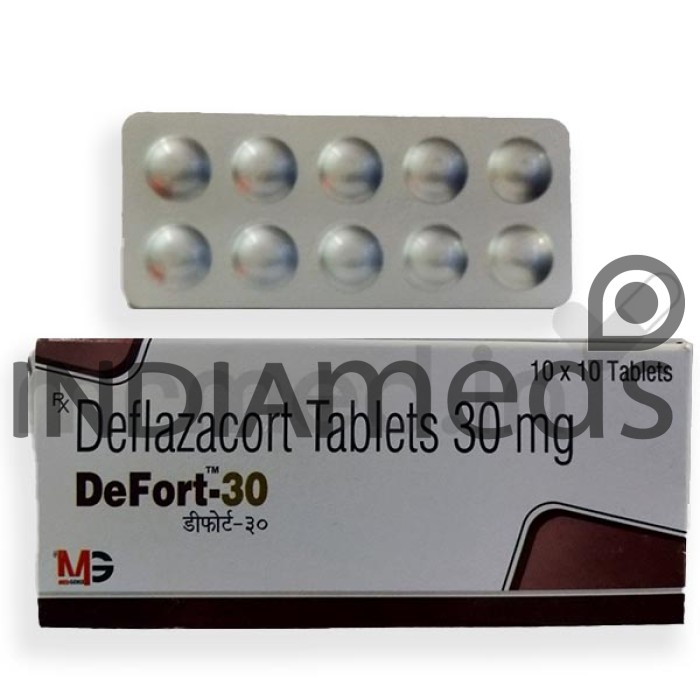Defort 30mg Tablet consists of the active ingredient Deflazacort. It is a synthetic glucocorticoid (type of steroid) medication used to treat various conditions, such as inflammation, allergies, autoimmune disorders, and certain types of cancers. This medicine works by suppressing the immune system and reducing inflammation in the body. In particular, it is commonly used to treat Duchenne muscular dystrophy (DMD), a genetic disorder that causes progressive muscle weakness and wasting. It is believed to improve muscle strength and delay the progression of the disease in some patients with DMD.
Visit your physician immediately if you get chickenpox or measles. Before taking this medicine, tell your healthcare provider if you are sensitive to Defort 30mg Tablet or its ingredients. Do not receive live or attenuated vaccines during this treatment. If you have diabetes, tell your healthcare provider they may adjust your diabetes medications or monitor your blood sugar more closely during treatment. If you are planning to have surgery, you should talk to your healthcare provider about when to stop taking Defort 30mg Tablet and when it is safe to resume taking it after surgery.
- Inflammation in asthma
- Arthritis
- Allergies
- Post-transplant surgery immune suppression
- Duchenne muscular dystrophy
- Inflammatory bowel disease
- Multiple sclerosis
- Eczema
- Psoriasis
- Certain types of cancer, such as lymphoma and leukemia
Therapeutic Effects of Defort 30mg Tablet
Pregnancy
Defort 30mg Tablet may harm the developing fetus, so it is unsafe to use it during pregnancy.
Breast Feeding
It is unknown whether Defort 30mg Tablet is excreted in human milk. So breastfeeding women should consult their doctor before taking it.
Lungs
Defort 30mg Tablet can suppress the immune system and increase the risk of lung infections, especially in people with underlying lung conditions. It may also worsen symptoms of certain lung conditions, such as fungal infections, tuberculosis, or pneumocystis pneumonia.
Liver
Defort 30mg Tablet may be unsafe for people with liver disease or impaired liver function. This is because the liver is responsible for metabolizing and eliminating the medication from the body, and a compromised liver may not be able to process the medication effectively. This medication can cause liver damage or liver enzyme abnormalities, worsening liver function in people with existing liver problems.
Alcohol
It is generally not recommended to consume alcohol while taking Defort 30mg Tablet, as alcohol can increase the risk of side effects associated with the medication.
Driving
Defort 30mg Tablet may cause dizziness, drowsiness, or blurred vision in some people. Therefore, if you experience any of these side effects while taking it, you should avoid driving or operating heavy machinery until you know how the medication affects you.
Serious:
- Allergic reactions (rash, hives, or difficulty breathing)
- Severe stomach pain or bloating
- Bloody or black stools
- Vision changes (blurred vision or seeing halos around lights)
- Increased blood sugar levels or diabetes
- Osteoporosis or bone fractures
- Cataracts or glaucoma
- Increased risk of infections, such as tuberculosis or fungal infections
Common:
- Increased appetite
- Weight gain
- Swelling in the legs or ankles
- High blood pressure
- Mood changes, such as irritability or anxiety
- Difficulty sleeping
- Headache
- Dizziness
- Nausea
- Vomiting
- Abdominal pain or discomfort
- Acne
- Increased risk of infections
Defort 30mg Tablet can be taken long-term but may increase the risk of side effects such as osteoporosis, weight gain, and high blood pressure. It is important to discuss the risks and benefits of long-term use with your healthcare provider and to monitor for any potential side effects regularly.
Defort 30mg Tablet may increase blood sugar levels. So, caution should be exercised when administering the medication to individuals with diabetes. Your healthcare provider may need to monitor your blood sugar levels more closely while you are taking it.
Defort 30mg Tablet should be used with caution in patients with active or latent tuberculosis (TB) infection because it may suppress the immune system, which can worsen TB infection. Therefore, it is important to inform your healthcare provider if you have TB or a history of TB before starting this medication. In some cases, your healthcare provider may recommend monitoring for signs and symptoms of TB.
Defort 30mg Tablet should be used cautiously in patients with kidney problems because it can affect kidney function. Your healthcare provider may need to adjust the dosage or monitor your kidney function more closely if you have kidney problems while taking this medicine.
Defort 30mg Tablet, like many other corticosteroids, may cause changes in mood, behavior, or thinking, particularly in individuals taking high doses or having a history of mental health conditions. These changes may include irritability, anxiety, or depression. In some cases, this medicine may also cause more severe mental health effects, such as psychosis or mania.
Yes, weight gain is a common side effect of Defort 30mg Tablet. It is important to follow a healthy diet and exercise regularly to help manage weight gain while taking it.
Molecule name: Deflazacort | Therapeutic class: Corticosteroid |
Pharmacological class: Glucocorticoids
| Indications: 1. Inflammation in asthma. 2. Arthritis 3. Allergies 4. Post-transplant surgery immune suppression 5. Duchenne muscular dystrophy 30. Inflammatory bowel disease 7. Multiple sclerosis 8. Eczema 9 Psoriasis 10. Certain types of cancer, such as lymphoma and leukemia |








